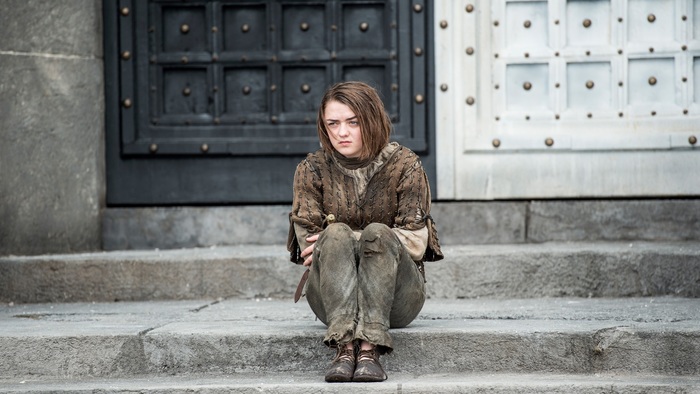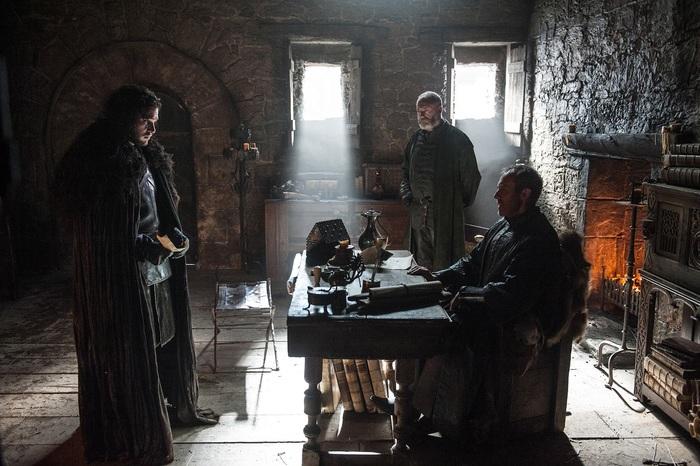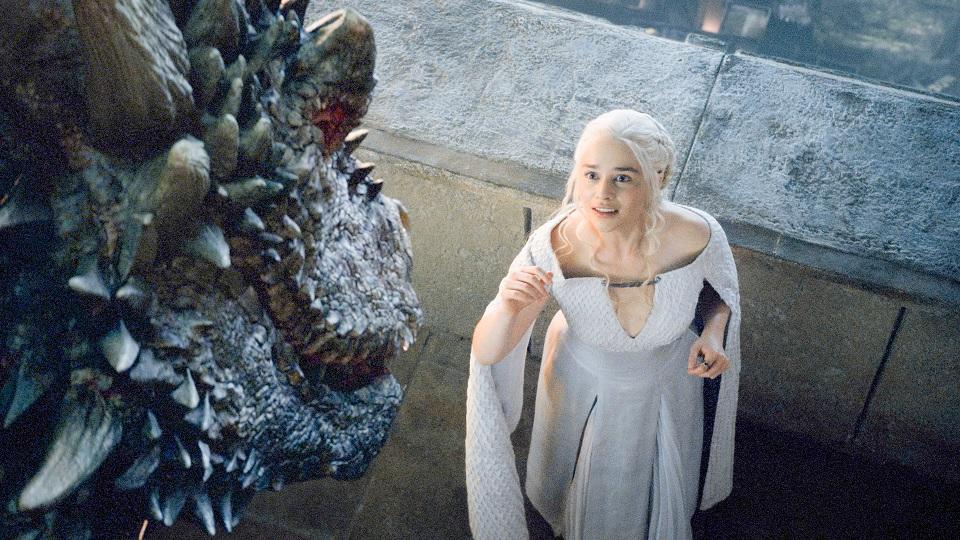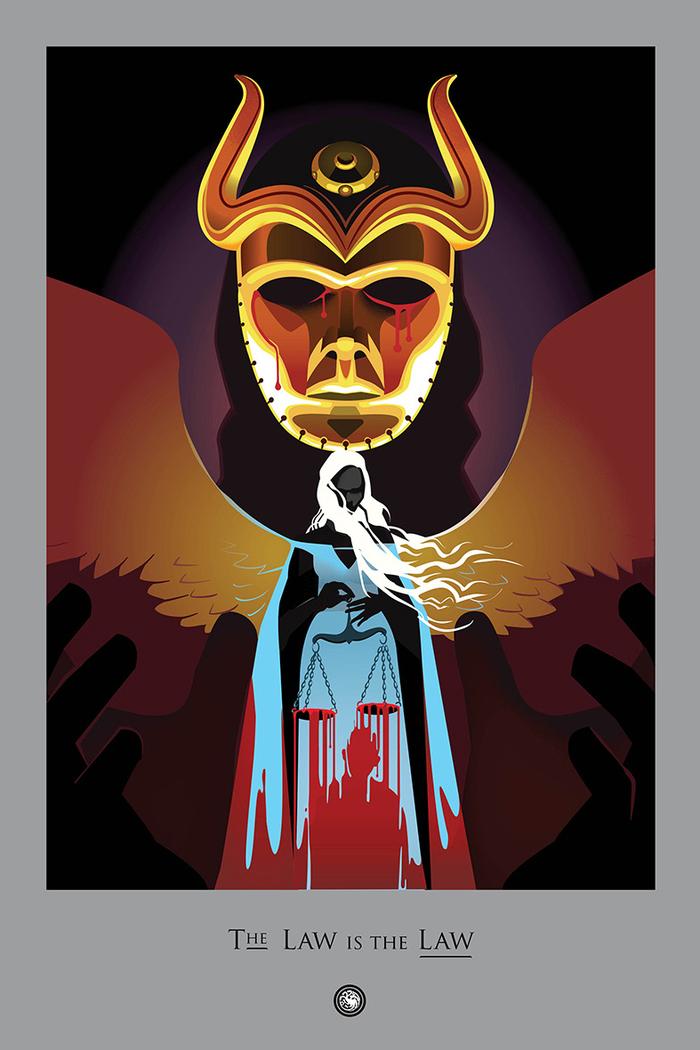
“The House of Black and White”, written by David Benioff and Dan Weiss, is Michael Slovis’ second foray into the behemoth that is Game of Thrones. The episode is more of a “Premiere: Part Two” than it is its own hour, but this can be excused due to the increasing number of storylines the writers have to juggle.
While an initial reading will suggest that the episode title refers to the physical building in Braavos, it also applies to the familial houses on display in the hour, and the differing blossomings of the values of good and evil in each. This has always been one of the core themes underpinning the show, and while I personally think the nuance slips up occasionally when manifested in extremes (such as in the characters of Brienne and Ramsay), in this particular context it bears fruit worthy of discussion.
The episode opens on a shot of Maisie on a backlot staring at a green screen, before the full magnificence of Braavos is revealed. These Braavosi scenes were shot in and around the Croatian towns of Split and Šibenik, and the set dressers and costume designers spared no expense in ensuring they visually conveyed this new culture to us effectively. We had previously seen an interior snippet of the city when Stannis and Davos visited the Iron Bank last season, but here we are shown the canals and docks in all their Venetian glory.
Moving swiftly onwards, Littlefinger brutally (albeit accurately) deconstructs Brienne’s failed efforts over the last few seasons, thereby convincing Sansa to remain his ward for the time being. There are a few interesting shots in this interior sequence that sadly don’t last long enough. DP David Franco uses forced perspective and a telephoto lens to make Brienne tower over Sansa and Littlefinger. This simple technique is something the show could employ more often, particularly when filming coverage of the Mountain (not that Thor isn’t already huge). Unfortunately, due to the multiple directors per season, the flavour of direction is not always consistent.

Ignoring how the plotline resolves itself in the season finale, Alexander Siddig is suitably enigmatic in his introduction. Long before he was cast as the Lord of Sunspear, he topped many fans’ dream casting lists, and here it is easy to see why. The one-note characterisation of Ellaria Sand in season 5 never sat right with me, and that’s unfortunate, because I was intrigued by her in season 4 (and I loved Indira Varma in Rome). Ellaria is an obvious example of someone perceiving things irrationally, and in shades of solely black and white.
Speaking of black and white, is there a character up until this point who relentlessly applies this strict moral code to themselves and those around them more than Stannis Baratheon? Stannis is defined by his obligation to duty, made most evident through the story of how he dealt with Davos at Storm’s End. Here, we see Stannis beginning to compromise somewhat. He knows who he is dealing with in Jon, admiring the bastard’s easing of Mance’s suffering (although he’d never admit this), and begrudgingly accepting Jon’s refusal to swear fealty to him as king. He senses in Jon a healthy combination of both duty and honour, and a drive to do what is right – essentially, the most noble qualities in both Stannis and Ned.

I have an issue regarding the editing of Jon’s scenes in this episode. His elevation to command of the Night’s Watch comes too hotly on the heels of his refusal to accept Winterfell, and renders the sacrifice unremarkable by way of rapid replacement. Some time for him to stew on it would have made the conclusion more satisfying, whether we physically saw him deliberating on the matter or another scene provided a buffer zone. Brienne’s scene from the beginning of the episode would have been perfect for this purpose, given how she also makes the decision to stubbornly abide by her duty (to say nothing of Stannis’ dying words to her literally being “Do your duty”).
The King’s Landing Small Council scene in this episode has remained memorable to me, and that is largely due to Ian Gelder’s performance as Kevan Lannister. Reappearing briefly in this season for the first time since season 2, he delivers a perfectly respectful verbal smackdown upon Cersei – one that is as memorable for Gelder’s clipped line delivery as it is by his strength of character amongst the other sycophantic council members. It speaks to Nina Gold’s eye for talent that such a small role can have such a large impact. Add to all of this a touch of levity brought by Roger Ashton-Griffiths’ delightfully innocent portrayal of Mace Tyrell, and we have a great scene.

“Mercy, fair trial; these mean nothing to them. All they understand is blood!” Mossador’s bleak advice is grossly misinterpreted by Daenerys after he takes her agency from her, and results in the former slave’s own death as she single-handedly alienates the half of the Meereenese population most loyal to her.
There is an apt parallel between Ellaria and Daenerys in this episode. Both characters wish to enact their personal perception of justice. While Ellaria’s plan doesn’t come into play until much later, she is still vocal about her desires. Her scene with Doran is full of antagonism and negative energy. Dany’s scene with Barristan is diplomatic, and involves discussion and positive energy. Whether coincidental or not, the costuming reflects this. Ellaria is garbed in black and spews hate and vitriol, while Daenerys is garbed in white and truly believes herself to be making a just and honourable decision. It’s not exactly subtle, but it does convey a point.

Later on, Dany reaches out to Drogon, but he flies away. Again, the colours are important. The Black abandons the White. They are incompatible, and trying to force them together is an exercise in futility. This is an important lesson for many characters in the show, as well as in a more metaphysical sense for the story.
The content of Arya’s scenes during this episode starts the throttle for a theme that is still growing as we’re about to watch season 6 – the theme of identity. Furthermore, the theme of identity ties into the overall theme of the episode. Who was Arya before? Who is she now? Who does she hope to become? In becoming no one, will she leave behind the vengeful drive and determination that has characterised her thus far? Can she truly become no one, and if not, where does that failed process leave her? Morality has been a staple of Arya’s characterisation ever since the first season, and it couldn’t be more apparent than it is now. The doors of the House of Black and White stand for that. One may be permitted to enter and step on the path that leads to becoming no one, but all good and evil, all black and white, all essence of self that may identify an individual – it must all be left at the door.
Memorable lines:
“… Jaime fuckin’ Lannister!” – Bronn
“Are we really going to spend the entire road to Volantis talking about the futility of everything?”
“You’re right. No point.” – Varys and Tyrion
“I found him there after the battle was over, in a puddle of his own making.” – Samwell Tarly
Character introductions:
Doran Martell
Areo Hotah
Trystane Martell
The Not-so-Kindly Man
Character deaths:
Mossador
Beautiful Death for “The House of Black and White”:
Final note:
I’ve just noticed that I haven’t mentioned either Jaqen H’ghar or Tom Wlaschiha once in this piece. That isn’t by design, it’s just that there is nothing further to his appearance in the episode than his appearance in the episode. I know Sue will either kill me or kick me off the site if I don’t mention him, so, here you go, Sue:
Jaqen is great.
Tom is great.
Everyone is happy. On to episode 3!
The post Game of Thrones Memory Lane 502: The House of Black and White appeared first on Watchers on the Wall.
Via http://watchersonthewall.com

No comments:
Post a Comment